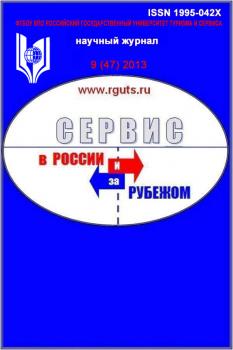Following an analysis of factors which hinder the development of the regional tourism sector, for the purpose of the regional travel industry development the article justifies the need for development of a new product of the Crimean tourism industry – food tourism. The article explores the potential of the concept of food tourism promotion and development based on prospects available for the different parties concerned. To identify the parties concerned and their motives, the article has addressed conceptual issues relating to a connection between food tourism and tourism sector development; potential of food tourism as an instrument of region development; strategy to be evolved to encourage development of food tourism. It has been established that the parties interested in the origin and development of food tourism may be grouped into four separate categories depending on geographic scope of their operations, business profile and value of their interests: 1) “state regulatory authorities” – regional and municipal state authorities; 2) “food intermediaries” that comprise a wide range of the concerned market players involved in tourism and related sectors; 3) “farmers (producers) and restaurant keepers” involved in provision of food services or production, “public concerned” – volunteers involved in surveys, the findings of which may be used for the development of strategies. It has been found out that the development of food tourism in the Republic of Crimea requires consolidation of efforts, knowledge and capabilities of all the parties interested in the diversification of tourism product, extension of time frames of a high tourist season and increase in marketability of the regional tourism product, in particular, and tourism sector, in general.
food tourism, regional economy, strategy, development, party concerned
1. Hall C.M. Culinary Tourism and Regional Development: From Slow Food to Slow Tourism?. Tourism Rev. Int. 2006. № 9(4). P. 303-306.
2. Hall C.M., Mitchell R. Gastronomic tourism: Comparing food and wine tourismeexperiences/Niche tourism: Contemporary issues, trends and cases. Oxford: Elsevier Butterworth-Heinemann, 2005. R. 73-88.
3. Gilmore J., Pine B. Authenticity: what consumers really want. Harvard: Business School Press, 2008. 415 r.
4. Lin Y.-C., Pearson T.E., Cai L.A. Food as a Form of Destination Identity: A Tourism Destination Brand Perspective //Tourism and Hospitality Res. 2011. № 11. P. 30-48.
5. Henderson J.C. Food Tourism Reviewed//British Food Journal. 2009. № 111. R. 317-326.
6. Freeman R. Edward. Strategic Management: A stakeholder approach. Boston: Pitman, 1984. 276 p.
7. Logunova N. A. Ispol´zovanie marketingovogo podkhoda pri formirovanii strategii razvitiya kruiznogo turizma. Prakticheskiy marketing. - 2014. - № 4 (206). - S. 31-38.





